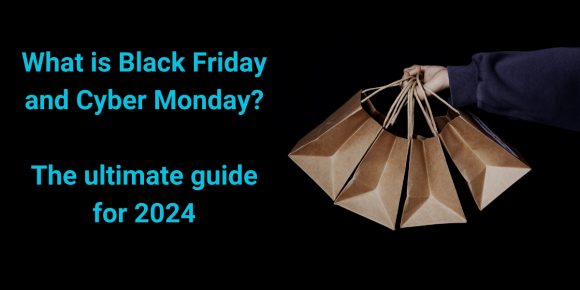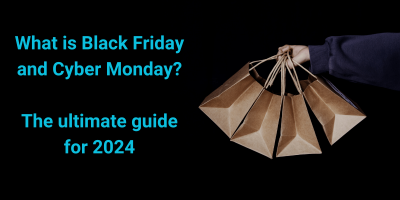Black Friday and Cyber Monday are two of the biggest shopping events of the year.
It also marks the start of the holiday shopping season, when businesses across various industries offer competitive deals.
While Black Friday and Cyber Monday had different origins – one in-store and the other online – they have evolved into massive shopping events popular around the globe.
This guide covers everything you need to know about these shopping events, from their origins to current trends.
We’ll also look at how businesses can maximize these trends.
What is Black Friday and Cyber Monday?
Black Friday falls on the fourth Thursday of November. In the US, it is the day after Thanksgiving.
This day has become widely known as the unofficial start of the holiday shopping season.
The term ‘Black Friday‘ technically refers to the point in the year when retailers begin to turn a profit, or ‘go into the black’ due to a surge in consumer spending before the holiday season.
Cyber Monday, on the other hand, is the Monday following Black Friday. It was created in 2005 to encourage online shopping. This day is for retailers to share exclusive online deals.
Originally a digital alternative to Black Friday, Cyber Monday has since become one of the largest online shopping days globally.
It rivals (and often even surpasses) Black Friday in terms of sales, due to the convenience of online shopping.
Black Friday history
Black Friday originated in the United States and has since become a global shopping phenomenon.
The term first gained popularity in the 1960s when Philadelphia police used it to describe the chaotic traffic and crowded stores that occurred the day after Thanksgiving.
By the 1980s, retailers had adopted the term and began using it to promote sales and discounts.
With the advent of online shopping, Black Friday expanded beyond physical stores. Retailers now offer online deals alongside in-store promotions, allowing customers to both shop in store or from the comfort of their homes.
Over the years, Black Friday has evolved into an extended shopping period, with some retailers offering deals throughout the entire week.
Cyber Monday history
Cyber Monday was coined in 2005 by the National Retail Federation (NRF) to promote online sales.
At the time, online shopping was still gaining traction, and Cyber Monday was designed to appeal to tech-savvy customers who preferred to shop online rather than face the crowds on Black Friday.
The idea was an instant success, with online retailers reporting a significant boost in sales.
Today, Cyber Monday is a global event, with retailers offering exclusive online deals and discounts across a wide range of categories.
The convenience of online shopping, combined with attractive offers, has made Cyber Monday one of the biggest shopping days of the year.
Black Friday and Cyber Monday: The differences
Though both Black Friday and Cyber Monday are now synonymous with major discounts and sales, they cater to slightly different shopping behaviors, buying trends, and audiences:
- Black Friday is for in-store shopping (but online deals aren’t excluded.)
- Cyber Monday is purely an online event.
- Black Friday‘s “golden items” are electronics and appliances.
- Cyber Monday‘s “golden items” are tech gadgets, fashion, and smaller electronics like smartphones and laptops.
Despite these differences, the lines between Black Friday and Cyber Monday have blurred in recent years.
Many retailers now extend their sales throughout the entire weekend, creating what is often referred to as “Cyber Week.”
Why should you care about Black Friday
According to Adobe Analytics, consumers in the US spent a record $9.12 billion online during the Black Friday period in 2022.
In addition, Black Friday was also the most popular shopping event globally that year, with Statista reporting an estimated 154 million US consumers partook in the world largest shopping spree.
ALSO READ: Black Friday pitfalls: Here’s what not to do
Why should you care about Cyber Monday
Cyber Monday customers meanwhile spent $11.3 billion, making it the biggest online shopping day of that entire year.
The retail event also saw a surge in mobile shopping that year, with a significant portion of consumers opting to make their purchases through smartphones.
How retailers can prepare
Preparation is key if you want to maximize on the benefits.
The first step is to ensure your website is fully optimized to handle increased traffic.
Warning: Slow load times can drive potential customers away.
Secondly, offer exclusive deals or flash sales so your store can stand out from the competition.
Next, plan your inventory and ensure you have enough stock popular items. But also avoid overstocking.
Don’t forget to offer flexible shipping options to meet customer demands during the holiday rush.
Finally, leverage email marketing and social media to create anticipation, to keep customers informed of your best deals, and the buzz going.
Black Friday and Cyber Monday trends in 2024
Black Friday and Cyber Monday are not stagnant events. These shopping events will continue to evolve as shopping habits and technologies change.
Here are some key trends shaping these events:
1. Online shopping dominates:
Black Friday used to be all about in-store doorbuster deals, but lately, more shoppers prefer to get their Black Friday deals online.
The rise of e-commerce giants like Amazon has also played a huge role, especially since they offer exclusive online deals that appeal to the masses.
2. Extended sales periods:
Many retailers have also opted for a extended sale period, and no longer limit their discounts to a single day.
These days, Black Friday deals often start weeks in advance; they can even go on long after Cyber Monday sales end.
‘Cyber Week’ is one of the latest additions to this trend.
3. Mobile shopping:
Mobile devices play a massive role in both Black Friday and Cyber Monday sales.
Shoppers prefer to use their smartphones for browsing, comparing and buying products. This has resulted in many retailers optimizing their mobile shopping experience.
4. Sustainable shopping:
With the growing demand for environmentally-friendly products, some brands are using Black Friday and Cyber Monday to promote sustainable and eco-conscious items.
It’s a no brainer, since green-minded shoppers want ethical alternatives. As part of these benefits, shoppers are also choosing to support smaller, local businesses.
A study by Accenture back this up. Nearly half of consumers (48%) said they want to shop sustainably during Black Friday.
5. Omnichannel experience:
The single-channel model is a thing of the past. In 2024, retailers are blending online and offline shopping experiences.
Customers can shop online and pick up in-store (BOPIS), or vice versa. This model enhances convenience and streamlines the purchase process – a win for both shoppers and retailers.
According to Search Engine Land, the BOPIS trend increased significantly in 2022, with 20% of Black Friday shoppers opting for this method.
ALSO READ: AI in retail: 5 ways generative AI is changing the industry
Black Friday and Cyber Monday challenges
The combined power of Black Friday and Cyber Monday has changed the retail landscape for good.
While these shopping events provide a significant boost in holiday season sales, they also pose several challenges.
The challenges include, but are not limited to:
- Logistical difficulties
- Inventory hassles, both over- and understocking
- Shipping during the holiday rush
- Extreme discounts affect profit margins.
Nevertheless, benefits of preparing for Black Friday and Cyber Monday often outweigh the drawbacks.
Some of the benefits of include:
- Better marketing prospects and leads
- Profit boost before the holiday rush
- Customer satisfaction when they snag good deals
- Customer acquisition
- Repeat buyers
- Customer loyalty when they have a nice experience.
With the two largest shopping events of the year just months away, retailers have a golden opportunity to get their strategy in place before the rush starts.
Whether you’re looking to boost sales or expand your client base, understanding the trends and strategies behind these events is essential for success.
About the author
Cheryl has contributed to various international publications, with a fervor for data and technology. She explores the intersection of emerging tech trends with logistics, focusing on how digital innovations are reshaping industries on a global scale. When she's not dissecting the latest developments in AI-driven innovation and digital solutions, Cheryl can be found gaming, kickboxing, or navigating the novel niches of consumer gadgetry.











